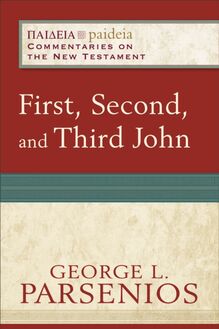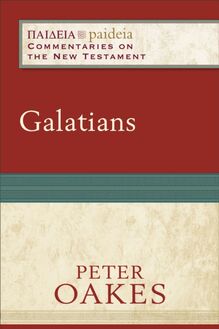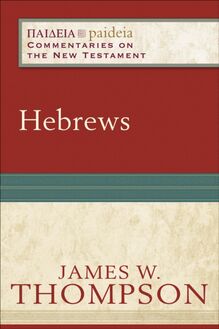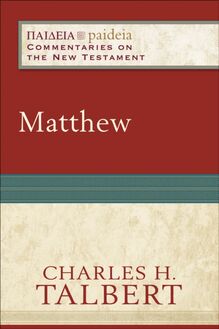Second Corinthians (Paideia: Commentaries on the New Testament) , livre ebook
265
pages
English
Ebooks
2013
Vous pourrez modifier la taille du texte de cet ouvrage
Obtenez un accès à la bibliothèque pour le consulter en ligne En savoir plus
Découvre YouScribe en t'inscrivant gratuitement
Découvre YouScribe en t'inscrivant gratuitement
265
pages
English
Ebooks
2013
Vous pourrez modifier la taille du texte de cet ouvrage
Obtenez un accès à la bibliothèque pour le consulter en ligne En savoir plus
Publié par
Date de parution
15 juin 2013
Nombre de lectures
0
EAN13
9781441241429
Langue
English
Poids de l'ouvrage
2 Mo
Publié par
Date de parution
15 juin 2013
Nombre de lectures
0
EAN13
9781441241429
Langue
English
Poids de l'ouvrage
2 Mo
G ENERAL E DITORS
Mikeal C. Parsons and Charles H. Talbert
A DVISORY B OARD
† Paul J. Achtemeier
Loveday Alexander
C. Clifton Black
Susan R. Garrett
Francis J. Moloney
© 2013 by Raymond F. Collins
Published by Baker Academic
a division of Baker Publishing Group
PO Box 6287, Grand Rapids, MI 49516-6287
www.bakeracademic.com
Ebook edition created 2013
All rights reserved. No part of this publication may be reproduced, stored in a retrieval system, or transmitted in any form or by any means—for example, electronic, photocopy, recording—without the prior written permission of the publisher. The only exception is brief quotations in printed reviews.
ISBN 978-1-4412-4142-9
Library of Congress Cataloging-in-Publication Data is on file at the Library of Congress, Washington, DC.
Unless otherwise indicated, all quotations from 2 Corinthians are the author’ s own translation. All other Scripture quotations are from the New Revised Standard Version of the Bible, copyright © 1989, by the Division of Christian Education of the National Council of the Churches of Christ in the United States of America. Used by permission. All rights reserved.
The photograph of Codex Sinaiticus (Brit. Libr., Additional Manuscripts 43725) is reproduced by permission of the British Library, London, England.
For Timothy and all those who walked with me on the road to Corinth , in gratitude and appreciation
Contents
Cover
Series Page
Title Page
Copyright Page
Dedication
List of Figures
Foreword
Preface
Abbreviations
Introduction
2 Corinthians 1:1–2 The Letter Opening
2 Corinthians 1:3–2:13 Part 1: Ministerial Crises
2 Corinthians 1:3–11 A Prayer of Praise and the Asian Experience
2 Corinthians 1:12–2:4 Paul ’ s Defense of His Integrity
2 Corinthians 2:5–11 A Disciplinary Matter
2 Corinthians 2:12–13 Frustration in Troas
2 Corinthians 2:14–7:4 Part 2: Paul Explains and Defends His Apostolic Ministry
2 Corinthians 2:14–3:6 Anxiety and Confidence
2 Corinthians 3:7–4:6 A Glorious Ministry
2 Corinthians 4:7–5:10 The Present and the Future
2 Corinthians 5:11–6:10 A Ministry of Reconciliation
2 Corinthians 6:11–7:4 A Plea for Personal Reconciliation
2 Corinthians 7:5–16 Part 3: The Arrival and Report of Titus
2 Corinthians 8:1–9:15 Part 4: Service to God’s Holy People
2 Corinthians 8:1–24 The Collection
2 Corinthians 9:1–15 A Further Appeal
2 Corinthians 10:1–13:10 Part 5: An Aggressive Taskmaster
2 Corinthians 10:1–18 Paul ’ s Missionary Task
2 Corinthians 11:1–15 On the Attack
2 Corinthians 11:16–12:13 Boasting like a Fool
2 Corinthians 12:14–13:10 Paul ’ s Third Visit to Corinth
2 Corinthians 13:11–13 The Letter Closing
Bibliography
Index of Subjects
Index of Modern Authors
Index of Scripture and Ancient Sources
Back Cover
Figures
1. Icon of the Apostle Paul
2. Map of Corinth
3. Paul’s Travel Plans according to 1 Cor. 16
4. Paul’s Actual Travels according to 2 Cor. 1
5. Moses with the Stone Tablets
6. Clay Jar from Qumran
7. The B ē ma in Corinth
8. A Roman Soldier
9. Coins of the Realm
10. The Lechaion Road
11. Spoils from the Jerusalem Temple
12. The Corinthian Agora
13. Paul Being Let Down in a Basket
14. A Corona Muralis
15. Final Lines of 2 Corinthians from Codex Sinaiticus
Foreword
Paideia: Commentaries on the New Testament is a series that sets out to comment on the final form of the New Testament text in a way that pays due attention both to the cultural, literary, and theological settings in which the text took form and to the interests of the contemporary readers to whom the commentaries are addressed. This series is aimed squarely at students—including MA students in religious and theological studies programs, seminarians, and upper-division undergraduates—who have theological interests in the biblical text. Thus, the didactic aim of the series is to enable students to understand each book of the New Testament as a literary whole rooted in a particular ancient setting and related to its context within the New Testament.
The name “Paideia” (Greek for “education”) reflects (1) the instructional aim of the series—giving contemporary students a basic grounding in academic New Testament studies by guiding their engagement with New Testament texts; (2) the fact that the New Testament texts as literary unities are shaped by the educational categories and ideas (rhetorical, narratological, etc.) of their ancient writers and readers; and (3) the pedagogical aims of the texts themselves—their central aim being not simply to impart information but to form the theological convictions and moral habits of their readers.
Each commentary deals with the text in terms of larger rhetorical units; these are not verse-by-verse commentaries. This series thus stands within the stream of recent commentaries that attend to the final form of the text. Such reader-centered literary approaches are inherently more accessible to liberal arts students without extensive linguistic and historical-critical preparation than older exegetical approaches, but within the reader-centered world the sanest practitioners have paid careful attention to the extratext of the original readers, including not only these readers’ knowledge of the geography, history, and other contextual elements reflected in the text but also their ability to respond correctly to the literary and rhetorical conventions used in the text. Paideia commentaries pay deliberate attention to this extratextual repertoire in order to highlight the ways in which the text is designed to persuade and move its readers. Each rhetorical unit is explored from three angles: (1) introductory matters; (2) tracing the train of thought or narrative or rhetorical flow of the argument; and (3) theological issues raised by the text that are of interest to the contemporary Christian. Thus, the primary focus remains on the text and not its historical context or its interpretation in the secondary literature.
Our authors represent a variety of confessional points of view: Protestant, Catholic, and Orthodox. What they share, beyond being New Testament scholars of national and international repute, is a commitment to reading the biblical text as theological documents within their ancient contexts. Working within the broad parameters described here, each author brings his or her own considerable exegetical talents and deep theological commitments to the task of laying bare the interpretation of Scripture for the faith and practice of God’s people everywhere.
Mikeal C. Parsons Charles H. Talbert
Preface
Just two days ago, I returned to the United States from a visit to Rome, where I participated in the twenty - second biannual meeting of the Ecumenical Pauline Colloquium held in the Benedictine Abbey of St. Paul ’ s Outside the Walls. This year ’ s colloquium was devoted to 2 Thessalonians and Pauline eschatology. Among the passages that we considered in detail was one from 2 Corinthians, insightfully presented by Morna Hooker, emerita of Cambridge, whose paper focused on 2 Cor. 5:1–10 .
Inevitably, the identity of Paul’s “we” arose in the discussion of the passage. Was Paul speaking about only himself, using some sort of editorial or apostolic “ we”? Did he perhaps also have in mind Timothy, the coauthor of this letter, and/or other missionaries? Did he perchance offer a reflection on the possibility of his own death as a paradigm for the Christian believers, who were his addressees, to ponder?
Not only did the twenty-seven of us who participated in the colloquium have the matter of the significance of the “we” of 2 Corinthians to consider; we also weighed the matter of the coauthorship of 1 and 2 Thessalonians, asking ourselves about the extent to which Silvanus and Timothy (1 Thess. 1:1; 2 Thess. 1:2) contributed to these letters and to what extent the letters’ characteristic “we” referred not only to Paul but also to Silvanus and Timothy.
Paul wrote his letters neither in a vacuum nor in isolation. His was a “team ministry.” His letters, including the Second to the Corinthians, reflect that approach to the proclamation of the gospel. He sent the letter with which this commentary is concerned not only on behalf of himself but also on behalf of Timothy, his brother ( 2 Cor. 1:1). In this letter he speaks about how he was virtually lost without Titus and how much he relied on Titus in his dealings with the Corinthians, especially with regard to the collection that was to be made as a service to God’s holy people in Jerusalem. Paul needed Timothy and Titus in order to function as an apostle of Jesus Christ.
No more than Paul was able to proclaim the gospel in spoken word and by written letter without the help of others have I been able to write this commentary on his gospel without the help of others. To begin, let me express my gratitude to James Ernest of Baker Academic and Brazos Press, who invited me to write this commentary at a time when I was still teaching at the Catholic University of America in Washington, DC. His support when the project was delayed due to a host of reasons beyond my control is particularly appreciated.
I must also thank those who helped to bring this study to its completion. The initial comments of Mikael Parsons, one of the general editors of the Paideia series, proved to be helpful indeed. Wells Turner, senior editor at Baker Academic and Brazos Press, and his team amazed me with their careful proofreading of the text. Rachel Klompmaker assiduously tracked down material for the illustrations, searching sometimes in vain for an illustration that I would have liked to include. To all of them I express my appreciation.
I am also grateful to colleagues at the Catholic University of Leuven in Belgium, particularly my dear friend Jan Lambrecht and his successor in Leuven, Reimund Bieringer. The latter, a former studen









